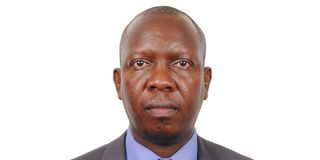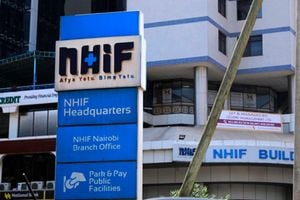President Ruto nominates Renson Mulele Ingonga as next DPP

Renson Mulele Ingonga has been nominated for the DPP post.
Mr Renson Mulele Ingonga is set to become the next Director of Public Prosecutions (DPP) following his nomination for appointment by President William Ruto in a communication to the National Assembly Speaker Moses Wetang’ula on Thursday.
The President has also nominated former Jubilee Party National Elections Board (NEB) chairman Mr Andrew Musangi for consideration by the House as the chairman of the board of Central Bank of Kenya (CBK).
Speaker Wetang’ula directed the House Committee on Justice and Legal Affairs (JLAC) to undertake the approval hearings of the DPP nominee as the committee on Finance and National Planning vets the nominee for chairman board of CBK.
Also read: Who will become Kenya's next DPP?
The Public Appointments (Parliamentary Approval) Act provides 28 days for Parliament to undertake approval hearings and approve or reject public office nominees.
The process of the approval hearings was to start immediately.
But with the National Assembly proceeding on a long recess from August 25, 2023, Speaker Wetang’ula directed that the 28 days within which the House is required to vet and approve or reject the nominees to start counting from September 26, 2023, when the MPs resume sittings after the long recess.
Article 157 of the Constitution states that the DPP shall be nominated and, with the approval of the National Assembly, appointed by the President and shall hold office for a term of eight years and shall not be eligible for re-appointment.
The same Article notes that the qualifications for appointment as DPP are the same as for the appointment as a judge of the High Court.
“The DPP shall have power to direct the Inspector-General of Police to investigate any information or allegation of criminal conduct and the Inspector-General shall comply with any such direction,” the constitution says.
If approved by the MPs and formally appointed by President Ruto buy way of a Gazette Notice, Mr Ingonga will replace Mr Noordin Haji following his appointment on June 14, 2023 as the Director-General National Intelligence Service (NIS).
Mr Haji was appointed as the DPP on March 28, 2018 following an interview with the Public Service Commission (PSC) and vetting by the National Assembly.
Mr Musangi, a lawyer and a senior consultant at LJA associates, once served as the Jubilee Party NEB chairman during the immediate former President Uhuru Kenyatta’s time.
If approved by the House and formally appointed by the President, Mr Musangi will replace lawyer Mohamed Nyaoga whose four year-year term as CBK board chairman expired in June 2023.
Lawyer Nyaoga was first appointed as the CBK board chairman in June 2015 for a four year-term that would later be renewed in 2019.
Article 231 of the constitution and sections 10 to 15 of the CBK Act, provide that a person qualifies to serve as chairman of the board of CBK if they hold a masters degree in economics, finance or law from a recognized institution.
“Such a person has to be knowledgeable of matters related to CBK functions and must have at least 10 years of experience at top management levels in economics, finance or law,” the law says.
The CBK Act requires the president to appoint the CBK board chairman with the approval of Parliament for a period of four years. The members are also eligible for re-appointment for one further term of four years.
The law mandates the CBK board chairperson to convene and chair the meetings of the CBK board.
The law further indicates that the meetings of the board be held once in every two months with the quorum of five members, including at least three directors.
Unlike the Governor of CBK, the CBK board chairman lacks the security of tenure while overseeing the workings of the country’s top bank that regulates the operations of the local commercial banks.
As the CBK board chairman, Mr Musangi will appraise the performance of the CBK Governor and other than formulation of the monetary policy, will also determine the bank’s policy and review how the bank’s management uses public resources. Previously, the Governor chaired CBK board meetings.





